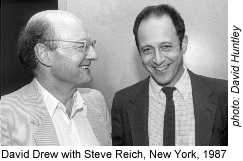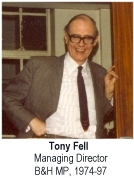|
|
Boosey & Hawkes Music
Publishers (www.boosey.com/composers
)
Drew joined Boosey & Hawkes in
October 1975 as Head of the Contemporary Music Department and was appointed to
the Board of B&H MP soon after. His duties included liaisons with the
Estates of Bartók, Blacher, Prokofiev, and
Stravinsky. Among the contemporary composers previously or currently
under exclusive contract with B&H MP were Gottfried von Einem,
Nicholas Maw, Peter Maxwell Davies, and Yannis
Xenakis.
The composers
introduced to the B&H MP catalogue during Drew's seventeen years with the
company were predominantly of the younger generation:
HK Gruber
York Höller
Robin Holloway |
David Horne
Jonathan Lloyd
Tona Scherchen |
Kurt Schwertsik
Wolfgang von Schweinitz
Andrew Toovey |
Two senior composers were
introduced to the B&H catalogue during the same period:
| Henryk Mikolaj Górecki |
Berthold Goldschmidt |
|
Two publishing initiatives
involved major acquisitions from other publishers, together with a few new
copyrights:
| Roberto Gerhard |
Igor Markevitch |
|
Boosey & Hawkes
Inc.
From its earliest days - under the
auspices of Ralph Hawkes himself - the Boosey & Hawkes catalogue of
American composers was administered by the affiliate company in New York.

With several of these composers -
notably Carter, Copland, Bernstein, and Virgil
Thomson - Drew was already acquainted before joining B&H. Among his new
acquaintances were: John Adams, Alberto Ginastera, Barbara
Kolb, Steve Reich, Ned Rorem, and Michael Torke.
The promotion-manager and
subsequently Vice-President of B&H Inc during the second half of the 1980s
and the early 1990s was the unforgettable and irreplaceable David Huntley
(1947-1994). Dedicated though he always was to the B&H catalogue as a
whole, his own musical philosophy might fittingly be described as postmodern.
On both sides of the Atlantic, his influence was - and remains - considerable.
His last and typically brave public appearance was for the premiere in
Minnesota on 19 January 1994 of a work dedicated to him: the Violin Concerto by
John Adams. Already gravely ill, he died 6 months later. A memorial concert was
held at the Merkin Hall, New York, on 13 October 1994. The programme included
many musical pieces by composer-colleagues, and there were further tributes in
the programme-book - among them, the following by David Drew:
DAVID HUNTLEY
 Whether in the legendary matchbox-theatre
that served as his apartment on 71st Street or in the echoing spaces of the
shoebox to which he subsequently migrated, the one-man vaudevilles David would
stage for his enchanted guests were characteristic both of his gifts as a
friend and his prowess as a publisher: cassettes and discs deftly conjured from
unlit recesses became the elements in an audio-visual display that seemed to be
pure entertainment until quite suddenly he would change and decisively lengthen
the perspectives. Whether in the legendary matchbox-theatre
that served as his apartment on 71st Street or in the echoing spaces of the
shoebox to which he subsequently migrated, the one-man vaudevilles David would
stage for his enchanted guests were characteristic both of his gifts as a
friend and his prowess as a publisher: cassettes and discs deftly conjured from
unlit recesses became the elements in an audio-visual display that seemed to be
pure entertainment until quite suddenly he would change and decisively lengthen
the perspectives.
Who knows whether David's knowledgeable passion for
old movies preceded or followed his passion for old movie-music. Meticulous
study of the TV programme-schedules had brought him great riches in the small
hours, and these he eagerly shared with friends during the larger ones. In the
name of make-believe or in search of the extinct, an evening with David might
begin with a rare specimen of early Amfitheatrof or a dip in the great
blue-green swimming-pool of Max Steiner; but before long, some rare Astaire or
lost Levant would return you to another order of realities, and somewhere on
the way back to the world of the living artist - where David had and will
always have his true home - he would start to prepare his first coup de
théâtre: "Take a look at this!", he might exclaim, "here's an
excerpt from the version of North Star the networks show, with some
music by guess-who if you don't know already"; and later, with a chuckle, "but
here's the version that got away, along with a lost bit of Aaron's
score".
Having explained how his aberrant North Star had "got
away" and how the network version had undergone a post-HUAC clean-up, he would
be reminded of the current Grohg project, which in turn would remind him
of other fascinations and delights. So infectious would be his enthusiasm and
his laughter that you mightn't even notice that all the while he'd be fixing
the controls on his cassette-deck in preparation for the next coup de
théâtre.
There were so many. The task of recovering music
and talents that "got away" was for him inseparable from the discovery of
gifted contemporaries who had yet to "arrive". Understanding, as he did, how
the rivers flow and the tides run in the world of music, he knew exactly where
to lay his nets for the general good. The prescient publisher and the honest
fisherman have this in common: they share a healthy respect for the principles
of conservation and sustainable development.
David's was a free spirit
dedicated to the survival of a musical environment in which mere exploitation
is instantly recognizable as a denial of freedom. In the admiration and
affection of his countless friends and colleagues, and also in the works of
those composers to whom he was closest, that spirit lives on.
5 October 1994/ 25
February 2003
Schott & Co (London)/B
Schott's Söhne (Mainz)
Drew was
in regular contact with Schott-London from the mid-1950s, and in particular
during the period when Howard Hartog was Managing Director, and Walter Bergmann
a distinguished member of his staff. With Schott-Mainz, Drew's contacts became
frequent in the 1960s, and continued on a regular basis until the retirement of
Ken W Bartlett, the Head of Promotion. Together with his wife Ilse - a pillar
of the British Council in Germany - Ken Bartlett remained one of Drew's most
valued friends, colleagues, and collaborators
Universal
Edition
Drew's working relationship
with UE (London) and its founder, Dr Alfred Kalmus, began in 1955, and with UE
(Vienna) two years later.
European American Music
Corporation
Chiefly but not
exclusively in connection with Kurt Weill activities, Drew was in close contact
with the President of EAM, Ronald L Freed (1937-2002), from 1980 until
his untimely death in 2002. For the programme-book of the memorial concert at
Carnegie Hall, New York (13 September 2002), Drew provided the following
tribute.
 "How Ronald would have laughed!". Already we've heard
it said, or said it ourselves. By such means and signs we recognize a form of
recovery from the shock of losing someone so active, so animated, so vividly
present. The echoes of Ronald's laughter now become part of his enduring
memorial, for it was the laughter of a wise colleague, a serious man, and a
true friend - one whose services to music were manifold. "How Ronald would have laughed!". Already we've heard
it said, or said it ourselves. By such means and signs we recognize a form of
recovery from the shock of losing someone so active, so animated, so vividly
present. The echoes of Ronald's laughter now become part of his enduring
memorial, for it was the laughter of a wise colleague, a serious man, and a
true friend - one whose services to music were manifold.
Ronald profoundly understood and
self-deprecatingly represented a great and nowadays often overlooked tradition
in music-publishing. So long as anything of that tradition continues to be
nourished on both sides of the Atlantic, his example will remain an inspiration
to his successors. Did we ever tell him that? Of course not: he'd just have
laughed. But now, as we remind ourselves in all seriousness of what he stood
for, one by one our favourite stories are called to mind, and somewhere in the
air are the beginnings of a legend....
David Drew, London, 1
September 2002
|


 Whether in the legendary matchbox-theatre
that served as his apartment on 71st Street or in the echoing spaces of the
shoebox to which he subsequently migrated, the one-man vaudevilles David would
stage for his enchanted guests were characteristic both of his gifts as a
friend and his prowess as a publisher: cassettes and discs deftly conjured from
unlit recesses became the elements in an audio-visual display that seemed to be
pure entertainment until quite suddenly he would change and decisively lengthen
the perspectives.
Whether in the legendary matchbox-theatre
that served as his apartment on 71st Street or in the echoing spaces of the
shoebox to which he subsequently migrated, the one-man vaudevilles David would
stage for his enchanted guests were characteristic both of his gifts as a
friend and his prowess as a publisher: cassettes and discs deftly conjured from
unlit recesses became the elements in an audio-visual display that seemed to be
pure entertainment until quite suddenly he would change and decisively lengthen
the perspectives. "How Ronald would have laughed!". Already we've heard
it said, or said it ourselves. By such means and signs we recognize a form of
recovery from the shock of losing someone so active, so animated, so vividly
present. The echoes of Ronald's laughter now become part of his enduring
memorial, for it was the laughter of a wise colleague, a serious man, and a
true friend - one whose services to music were manifold.
"How Ronald would have laughed!". Already we've heard
it said, or said it ourselves. By such means and signs we recognize a form of
recovery from the shock of losing someone so active, so animated, so vividly
present. The echoes of Ronald's laughter now become part of his enduring
memorial, for it was the laughter of a wise colleague, a serious man, and a
true friend - one whose services to music were manifold.